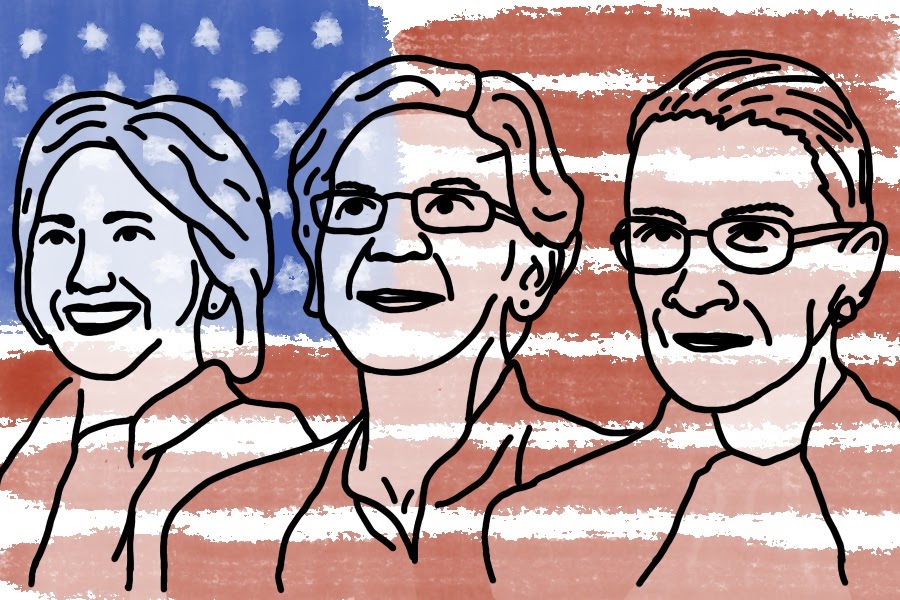Girls just wanna have fun without facing inherent biases
How high school debate and politics are underrepresented by women
Statistically, women have scored less speaker points from judges following a high school debate round. The Sidekick staff writer Anvitha Reddy discusses how leaders like Hillary Clinton, Elizabeth Warren and Ruth Bader Ginsburg help contribute to a more representative government and can lead to more women in debate.
April 8, 2020
High school debate just doesn’t have enough women.
“When you walk into a room and there’s my partner [Coppell junior Arnav Kashyap] and he’s male and the other team has both males and the judge is male. And you do realize that there is an evident lack of representation,” Coppell senior policy debater Vanuli Arya said.
In high school policy debate, it’s not uncommon to see a lack of women represented competing at the top level. Policy debate consists of two-member teams, and since the Tournament of Champions inception, there has never been an all female team to win it.
The cause of this disparity is unknown and likely caused by a multitude of factors. But several studies pinpoint that women, on average, receive less speaker points and it’s less common to see a woman win a debate round. The study also concluded that women are significantly less likely to continue debate for a second year
The lack of representation at the high school level translates into a bigger issue, the inadequate amount of women represented in government. In 2019, women made up 23.4% of the House of Representatives, and the astounding part is that 23.4% the highest percent in all of U.S. history.
Being a member of debate is instrumental in the development of public speaking skills, in fact, it’s not uncommon to see former debaters become politicians, like Massachusetts senator Elizabeth Warren.
In 2016, we had our first female presidential nominee, former first lady and Democrat Hillary Clinton, after almost 100 years of women being given the right to vote. While debating then- Republican nominee Donald Trump, Clinton was interrupted 40 times.
In the June 2019 presidential debate, The Atlantic found that women are given less speaking time and recognize the risk of coming off “too aggressive” which results in less rebuttals overall.
It is not uncommon to see women being criticized for being “too stand-offish” or “too submissive” which makes it hard for women to succeed in an environment where they are head-to-head with men. Though there are no longer systematic barriers for a woman to be in politics, there are preconceptions on how women should act and more often than not it’s to be submissive.
In 1956, Supreme Court Justice Ruth Bader Ginsburg, was one of nine students at Harvard Law School. Her female empowerment agenda started after being asked by her dean why she was taking a spot another man could fill. Ginsburg continues to be at the forefront of the feminist movement, continuing to change perspectives of a “women’s role.”
The ability to advocate for your beliefs under constant scrutiny is almost exclusive to debate, and grasping that skill can translate to immense success as a politician. To increase the representation little girls see in the government, it needs to start small, like in high school debate.
“It’s shown with people like Elizabeth Warren who talks alot about her days as a high school debater,” Arya said. “[Debate] has to do with women being able to graduate from high school and translate their confidence from activities to what they do later on”
Encouraging more women to lead and change stereotypes can only empower others to do the same, while fostering confidence which can lead to their influence on the national stage.
Over time, important strides have been made. Notably, a female team in policy debate from Topeka, Kan. was named fourth in the nation by the National Coaches Poll in March.
To increase outreach, CHS has started Coppell Debate Academy which addresses the concern for representation in debate by encouraging middle school students to be involved.
“[With the Coppell Debate Academy] it’s really great to have people started at the young level, ” Arya said. “The support needs to start from a younger age and then building up that confidence and support as they grow throughout the program.”
When more than half of our population is female, it’s critical that women are present and leading in positions of power like in politics, or just high school debate.
“Over the years, it’s been great seeing it change. But a lot of the times you see finals and elimination rounds of big tournaments are just two all male teams against each other,” Arya said. “It’s not discouraging per se but it’s interesting to see how we don’t see many females in elimination debates but we would really like to see that.”
Follow Anvitha Reddy @anvithareddytx and @CHSCampusNews on Twitter.












